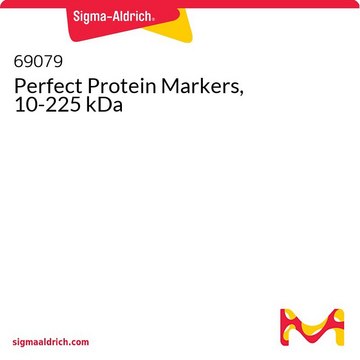MWND500
Kit for Molecular Weights 14,000-500,000 Non-denaturing
Synonym(s):
protein markers, protein molecular weight standards, protein standards
About This Item
Recommended Products
Related Categories
Application
Packaging
Proteins:
α-Lactalbumin from bovine milk
Carbonic Anhydrase from bovine erythrocytes
Albumin from chicken egg white
Albumin from bovine serum
Urease from Jack bean
Reconstitution
related product
Signal Word
Danger
Hazard Statements
Precautionary Statements
Hazard Classifications
Eye Irrit. 2 - Resp. Sens. 1 - Skin Irrit. 2 - STOT SE 3
Target Organs
Respiratory system
Storage Class Code
10 - Combustible liquids
WGK
WGK 3
Flash Point(F)
Not applicable
Flash Point(C)
Not applicable
Certificates of Analysis (COA)
Search for Certificates of Analysis (COA) by entering the products Lot/Batch Number. Lot and Batch Numbers can be found on a product’s label following the words ‘Lot’ or ‘Batch’.
Already Own This Product?
Find documentation for the products that you have recently purchased in the Document Library.
Customers Also Viewed
Protocols
Separation of Polyacrylic acid (PAA) 438 kDa; Polyacrylic acid (PAA) 235 kDa; Polyethylenimine (PEI) 266 kDa ; Poly(dimethyl diallyl ammonium chloride) (PIDADMACl) 204 kDa; p-Aminosalicylic acid (PAS) 7800 Da; p-Aminosalicylic acid (PAS) 257 kDa; Cationic dextran (11 kDa); Chitosan (13.4 kDa)
Our team of scientists has experience in all areas of research including Life Science, Material Science, Chemical Synthesis, Chromatography, Analytical and many others.
Contact Technical Service










